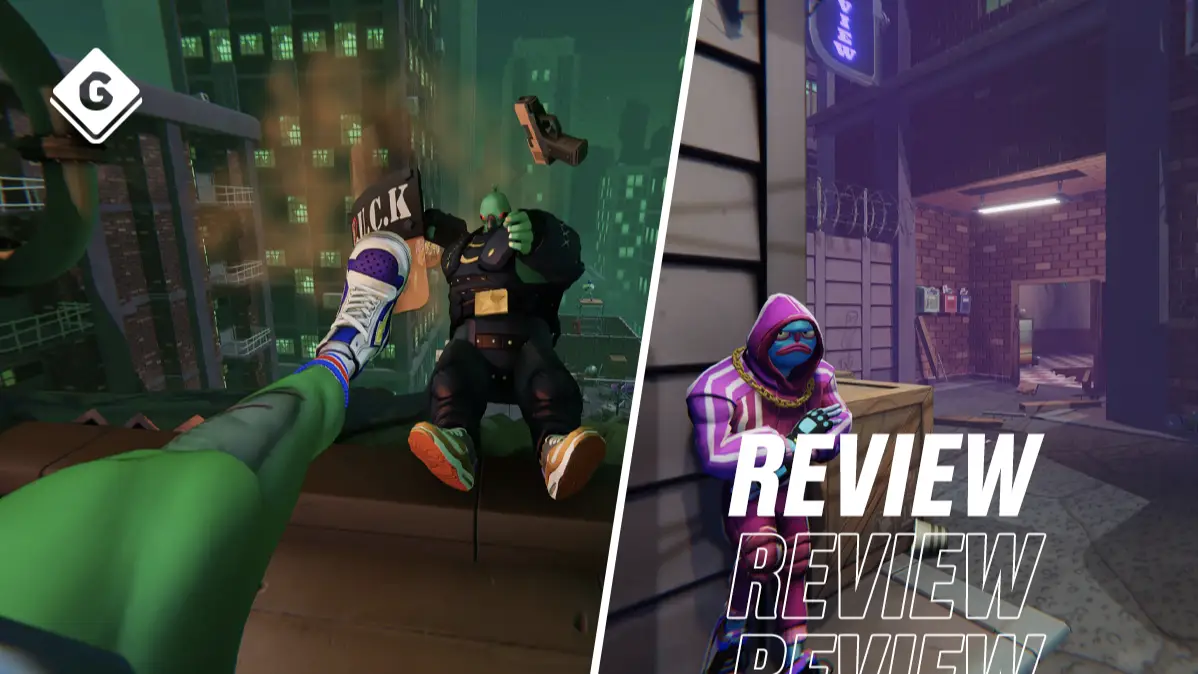
While playing Anger Foot, I often wished the game had been something else. Don’t get me wrong, the formula is good, it’s kind of SUPERHOT mixing with the brilliance of Hotline Miami, but it’s when the game veers away from the short, action-packed levels that Anger Foot shows it has more to it.
I’ll come to the gameplay in a moment, but let’s take a second to appreciate the style of this game. It’s often said that style over substance is a bad thing, but when the style is this good, I can’t help but be impressed. The game takes place in Shit City, a place where crime is rife. So rife that literally everyone is a criminal.
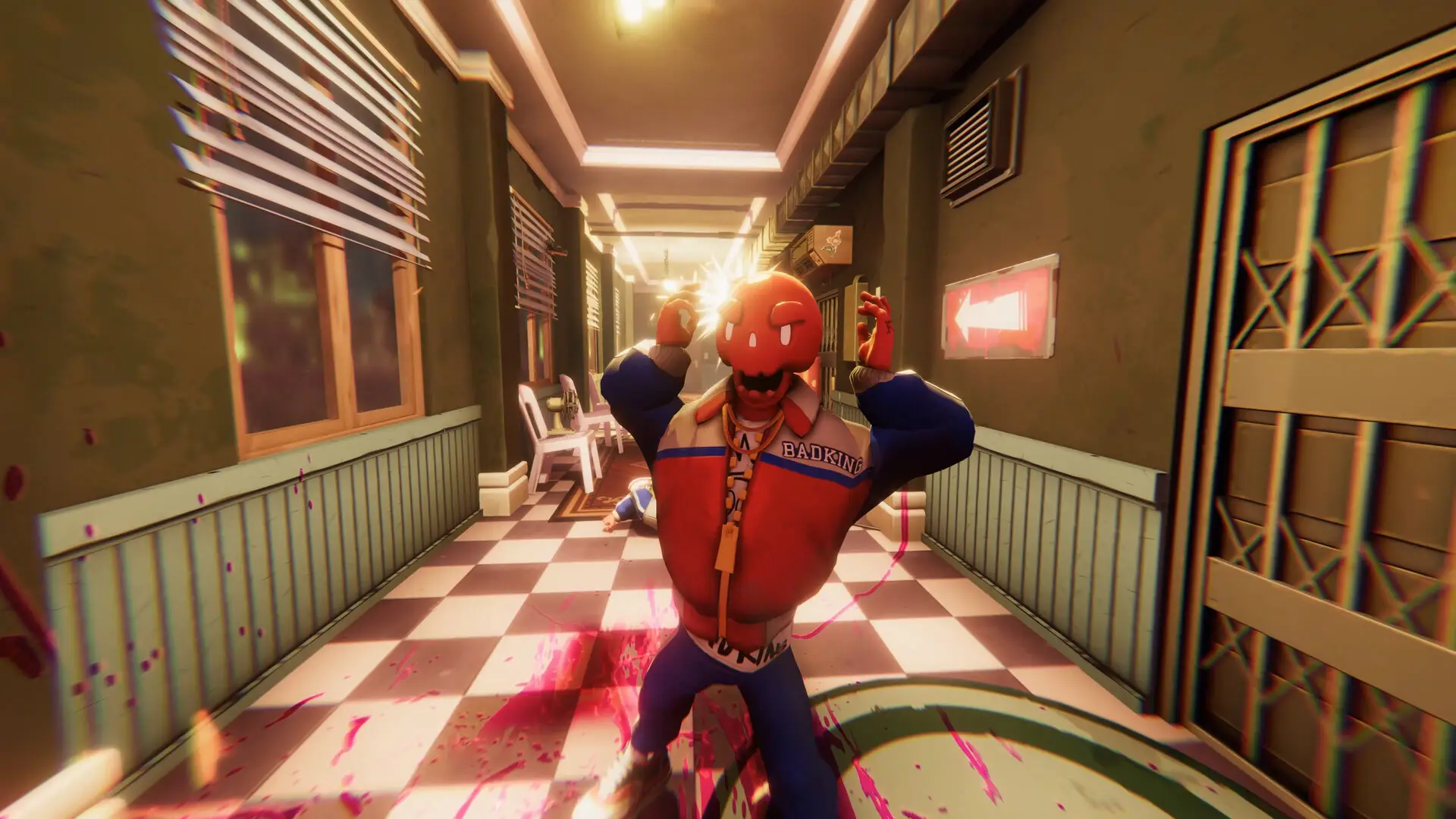
There was a moment when I was free-roaming within a level and approached two youngsters. One of them told me that when they went up the next set of stairs, they got mugged. The person next to them, with delightful comic timing said, “I’m a mugger.” You get the idea, everyone is a bad guy. Except they’re not. I met one crocodile-looking character who wanted to learn to read and blamed the poor education system of Shit City. He seemed nice.
Advert
It’s these moments where Anger Foot shines. It’s a bit silly, the characters are these weird larger-than-life creatures who look a bit like Muppets strung out on meth. The entire city has a charm to it. Of course, it’s supposed to be over-the-top and a little crude - there are often NPCs taking a leak in random places with a blurred bar over their sensitive areas - but it taps into a level of humour that I just wanted more of. Sadly, you don’t get much of that during the individual levels and these moments of exploration are few.
So, let’s get to what you actually do in this game. You kick things. And you shoot them too. I’m oversimplifying, of course. Essentially, you play as a guy who has had his precious shoe collection stolen by the gangs of the city. Your way to get them back is to take down the goons and get your shoes.
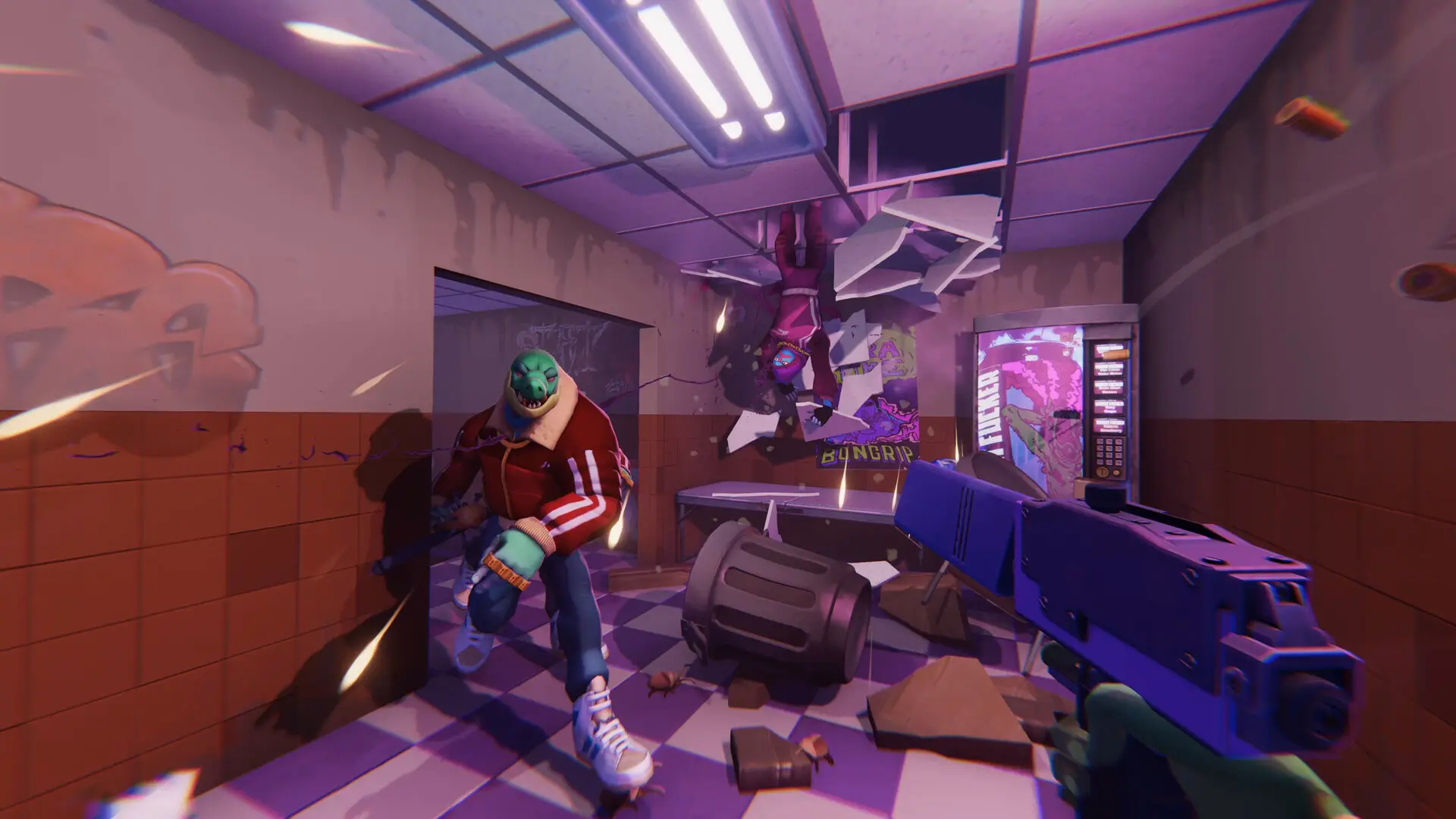
Each level is a different part of the city, you explore linear levels attacking everyone that moves, steadily making your way to the exit. The game is called Anger Foot so you’d expect to be kicking everything, right? Well, kind of. Kicking enemies, as well as shooting them, kills them in one hit. You can throw your weapon in order to pick up another, dropped by an enemy, rather than reload. It’s hard to tell whether you’re supposed to play loose and fast, or with more care. The former doesn’t always work out.
The combat, for the first few levels, takes some getting used to. Much like Hotline Miami, death comes often. Taking just a couple of shots from grunts will kill you, even less are needed from advanced enemies that are happy to throw around explosives. The problem with this is the repetition. Because the enemies spawn in the same place every time, each try feels more like a lesson in memorisation rather than learning how to combat each enemy. This is particularly so when everything dies to just one bullet. There’s no need for the SMG, for example, as the pistol does the job. And if they get close to you, a kick will suffice.
After the first part of the city, I felt like I’d already seen everything Anger Foot had to offer. The visuals and art style got better, plus there are some very cool enemies to see further down the line, but the combat never really won me over. I’d enter a level, die, learn where enemies spawned, and then play it slowly to shoot them before they even got a chance to see me. It left me wondering what the developer was going for.
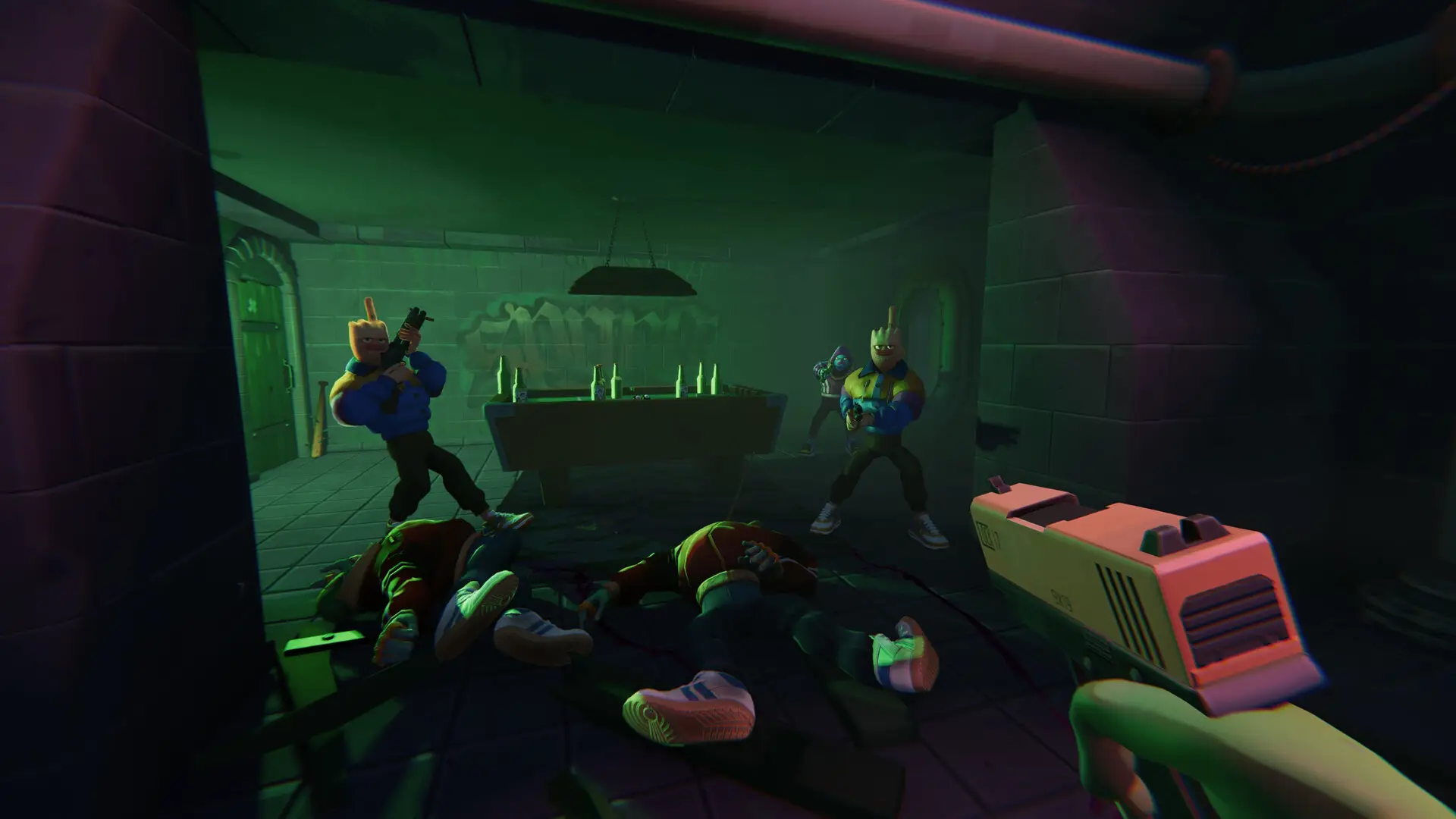
Speedrunners will have a blast, but playing fast just gets you killed quickly, though playing slow takes away the frenetic energy the game feels like it both needs and starts with. I knew I could play with speed, but why would I when I could beat a level taking it cautiously? Here’s another thing, once you’ve kicked down a door, the enemies will stream towards you. If you want, you can stand just inside the doorway and hold down the kick button. Suddenly, everything is getting booted into oblivion. Taking away any sense of improvisation surely removes the sense of joy?
Suddenly, the only way I was dying was from cheap attacks that come from behind, or from overly punishing rooms filled with a variety of enemies, leaving only a fraction of leniency.
There’s a lot of replayability, however. Completing a stage rewards you with a gold star, though there are more to claim if you complete certain tasks, like only kicking everything, or speedrunning the level. While this adds another layer, your mileage will only go as far as your patience.
Those stars go towards unlocking new shoes, all of which have a neat little feature. Some will electrocute enemies, another will replenish your ammo, while yet another pair gives you a double jump. Much like the different guns though, the lack of experimentation means that you’ll likely stick with the sandals that give you an extra life and resurrect you on the spot.
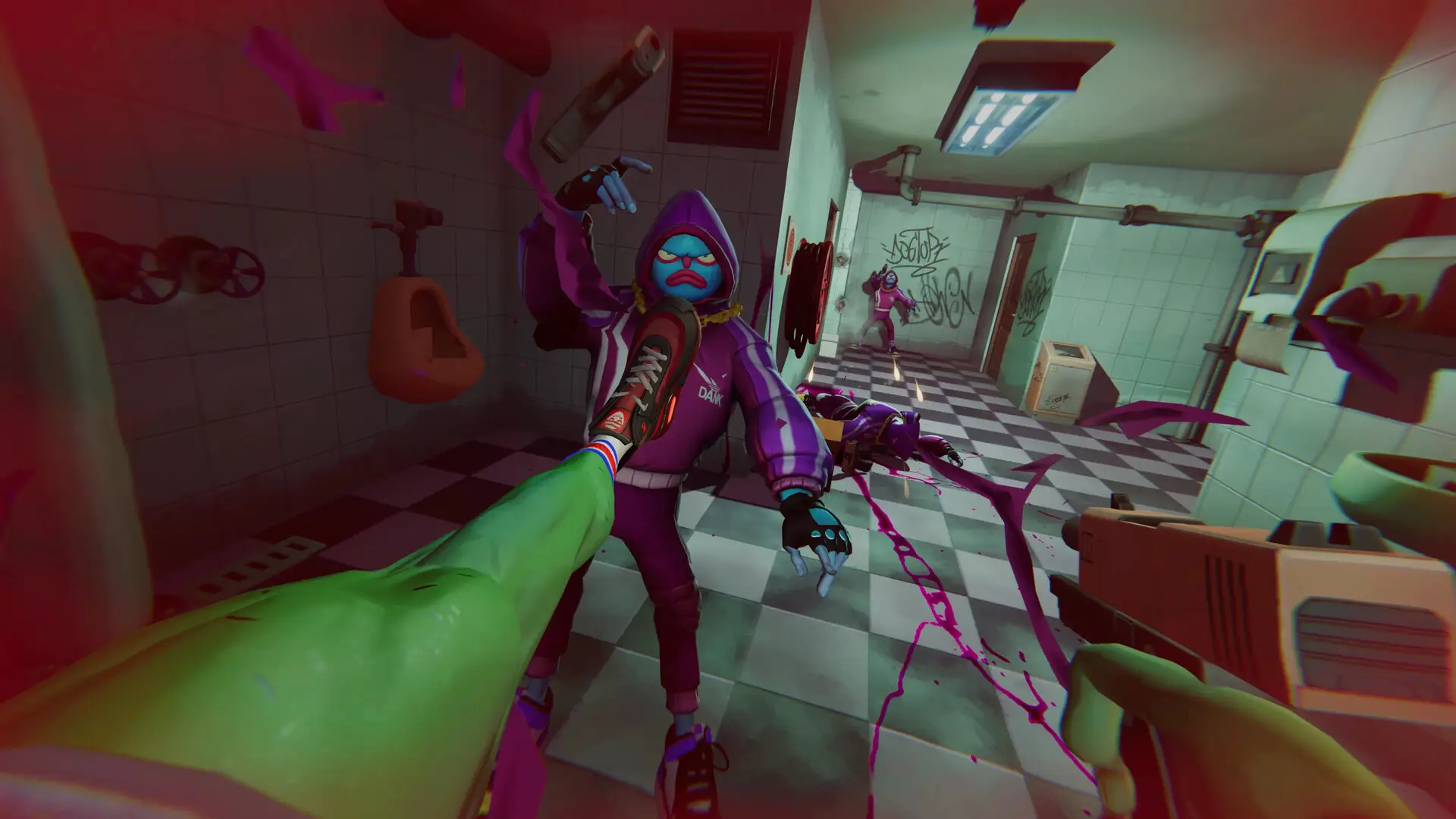
There’s a terrific game in here somewhere, but it’s tough to find among the odd choices in its creation. Odd highlights will pop up, like booting a grenade back to the lobber or puzzling your way around the bosses that can be ridiculously tough, and some chaotic moments will remove your cheese strats and force you to take on everything with your foot and your guns. I just wish there was more of this. Or at least some randomness that urges you to play around with everything included.
As a concept, Anger Foot is genius. I loved the city, the gangs, and the oddball humour. Oh, and the soundtrack is a thumping ass-kicker that constantly delivers big beats and funky grooves. However, the concept is restricted by itself. It certainly lives up to its name as you definitely can kick everything with your foot. I just wish I could have let loose, played around with different tactics, and embraced the chaotic absurdity that the developers were channelling with more depth.
Pros: Great identity, often funny, chaotic gunplay, and amazing style
Cons: Restrictive gameplay, repetitive, can be frustrating
For fans of: Hotline Miami, Neon White, SUPERHOT
6/10: Good
Anger Foot is available now on PC (version tested). Review code was provided by the publisher. Find a complete guide to GAMINGbible's review scores here.
Topics: Indie Games, PC, Steam
